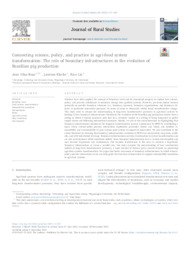Connecting science, policy, and practice in agri-food system transformation: The role of boundary infrastructures in the evolution of Brazilian pig production.
Connecting science, policy, and practice in agri-food system transformation: The role of boundary infrastructures in the evolution of Brazilian pig production.
Author(s): VILAS-BOAS, J.; KLERKX, L.; LIE, R.
Summary: Abstract: Scholars have often applied the concept of boundary work and its conceptual progeny to explain how science, policy, and practice collaborate to introduce change into agrifood systems. However, previous studies focused primarily on specific boundary elements (i.e., boundary spanners, boundary organizations, and boundary objects) or particular innovation processes (in terms of scope or timescale) within broad transformative change. This study aims to deepen the understanding of long-term transformative processes in agri-food systems by looking at how boundary infrastructures influenced the evolution of the Brazilian pig production system from a setting in which it mainly produced pork lard for a domestic market to a setting of being integrated in global supply chains and following international standards. Mainly, we add to the extant literature by highlighting that boundary infrastructures influenced the longterm transformative process experienced by BPPS by establishing a space where science-policy-practice interactions legitimized particular visions and values and instilled responsibility and accountability to spur various joint actions in support of innovation. We also contribute to the extant literature by showing that boundary infrastructures evolution in BPPS was incremental, long-term, multi-site, and with intertwined leverage. Boundary infrastructures provide structuration to system transformation and are also (re)structured while transitions unfold. Since boundary infrastructures have a certain directionality and may become hegemonic and exclusionary, this requires sensitiveness to the need to reorient a hegemonic boundary infrastructure or create a parallel one. Our study deepens the understanding of how coordination unfolds in long-term transformative processes, a topic deemed of interest given current debates on promoting agri-food systems transformation. We argue that better awareness of boundary infrastructures in which science-policy-practice interactions occur can help guide the direction of innovation to support sustainability transitions in agri-food systems.
Publication year: 2022
Types of publication: Journal article
Unit: Embrapa Swine & Poultry
Keywords: Agri-food sectors, Boundary work, Brasil, Brazil, Deep transitions, Direcionalidade, Directionality, Food systems transformation, Intermediaries, Intermediários, Setores agroalimentares, Sustainability transitions, Trabalho de fronteira, Transformação de sistemas alimentares, Transições de sustentabilidade, Transições profundas
Observation
Some of Embrapa's publications are published as ePub files. To read them, use or download one of the following free software options to your computer or mobile device. Android: Google Play Books; IOS: iBooks; Windows and Linux: Calibre.
Access other publications
Access the Agricultural Research Database (BDPA) to consult Embrapa's full library collection and records.
Visit Embrapa Bookstore to purchase books and other publications sold by Embrapa.

